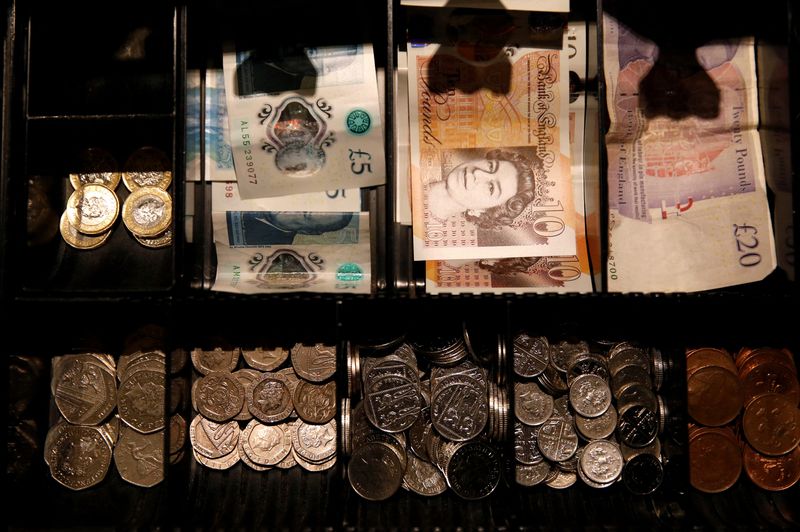By Naomi Rovnick, Alun John and Dhara Ranasinghe
LONDON (Reuters) – The British pound has advanced to an expected landslide election victory for the opposition Labor party, but the currency’s future depends on the next government convincing wary investors that its plans to restore a stagnant economy are credible .
On a trade-weighted basis, sterling has returned to levels not seen since the 2016 Brexit vote, as currency traders bet on a long era of currency volatility, driven by tumultuous politics under the ruling Conservative party, coming to an end.
If Labor wins on July 4, the left-wing government will have to maintain investor confidence while tackling economic challenges that the Conservatives have failed to solve, more than two dozen economists and former government officials say.
Britain’s public debt-to-GDP ratio is at its highest level in 63 years and foreign direct investment has fallen for four of the last five quarters to the end of 2023. To avoid cuts, Labor will have to raise taxes or increase borrowing, the British government says. This is what the Institute for Fiscal Studies think tank says.
As investors assess the next government’s response to these issues, the balance of risks for the British pound is uneven, as the currency has already priced in a strong Labor majority driving British growth.
“A less confident political scenario will weaken sterling much more and make it much more volatile,” said Costas Milas, professor of finance at the University of Liverpool, who studies the relationship between economic policy uncertainty and financial markets.
Led by Keir Starmer, Labor is about 20 percentage points ahead of the governing Conservatives, according to surveys.
GREAT BRITISH ‘PESO’
The British pound, once the world’s reserve currency, is trading below its dollar average for the four decades before 2016, but has outperformed all major peers this year at around $1.27.
The economy has fallen sharply from a low of $1.03 in 2022, when former Conservative Prime Minister Liz Truss launched an underfunded mini-budget that led to a rout in the bond market, pushed up debt costs and worsened inflation.
Sterling’s rollercoaster ride has prompted commentators to nickname the pound the “great British peso,” with parallels to risky emerging markets.
Its volatility has had an impact on the UK economy, creating a negative feedback loop.
Milas’ research found that economic policy uncertainty in Britain since 2016 directly caused stress on financial markets, including an increase in exchange rate volatility, causing the economy to grow less than it otherwise would have.
A Labor government with predictable policies backed by the markets could reverse that cycle, analysts say.
“If Labor follows the playbook and shows some sense of fiscal responsibility, that will be a big support,” said Guillermo Felices, PGIM Fixed Income’s global strategist.
“The strength you’ve seen in sterling lately is ultimately about (expected) stability,” said Morningstar strategist Michael Field.
Money markets expect similar interest rate cuts from the Bank of England and the European Central Bank this year.
But while the mini-budget debacle showed that fiscal policy for the pound is as important as interest rates, Labour’s exact policy is not yet known.
The IFS this week criticized both Labor and the Conservatives for releasing election manifestos that it said had “hidden and dodged” the big questions on taxes and loans, creating a “knowledge vacuum”.
Labor did not immediately respond to an email seeking comment on its plans and the pound.
CIRCUMSTANCE OR RELEASE?
According to LSEG data, analysts expect sterling to rise to $1.2875 within 12 months. Some see risks further away.
Labour, which has been out of government for 14 years, is keen to shake off a previous association as a tax and spend party.
Simon Harvey, head of FX research at Monex Europe, said currency traders were bullish on sterling in the short term as Britain’s public finances gave Labor little chance to overspend.
But if economic growth in Britain improves over time, he said: “There is still a risk of Labor swinging too far to the left, so people want to see how this will pay off in the long term, and investment managers may not like this in the next five years. years”.
Nikolay Markov, senior economist at Pictet Asset Management, tipped Labor to pursue a heavy investment scenario that would prove inflationary and have a negative impact on UK bond markets and the British pound.
Britain faces higher inflation than other wealthy Group of Seven countries, with annual price rises set to peak at 11.1% in 2022. A 10% depreciation of sterling would add 1.3 percentage points to British consumer price inflation over two years, Oxford Economics calculated.
Starmer has made pledges to boost investment in housing and infrastructure, which reflect US President Joe Biden’s policies, as very long-term.
“It’s a British version of Bidenomics,” said Giles Wilkes, an Institute for Government fellow and former adviser to British Prime Minister Theresa May. “There won’t be market-disturbing amounts of money involved.”
Roger Bootle, a former economic adviser to Britain’s Chancellor of the Exchequer in the 1990s, Kenneth Clarke, said Starmer’s finance chief Rachel Reeves will likely continue to “spending tight”.

But Dario Perkins, head of macro at TS Lombard and a former finance ministry adviser, said if labor market cuts put further pressure on public services, angry voters could drift towards populist parties, raising hopes that Great Britain Britain were to restore trade relations with Europe, it would disappear.
(This story has been refiled to correct the link to the image in paragraph 2)


